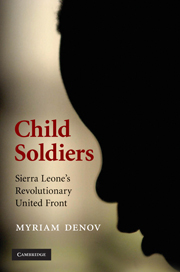Book contents
- Frontmatter
- Contents
- Acknowledgements
- Map
- Introduction: Child soldiers, iconography and the (il)logic of extremes
- 1 Children's involvement in war: The quandary of structure and agency
- 2 Recipe for rebellion: Civil war in Sierra Leone
- 3 Negotiating power: Research on and by child soldiers
- 4 ‘Becoming RUF’: The making of a child soldier
- 5 ‘Being RUF’: Victimization, participation and resistance
- 6 ‘Put dey gon don’: The unmaking of a child soldier
- 7 New battlefields
- References
- Index
3 - Negotiating power: Research on and by child soldiers
Published online by Cambridge University Press: 04 May 2010
- Frontmatter
- Contents
- Acknowledgements
- Map
- Introduction: Child soldiers, iconography and the (il)logic of extremes
- 1 Children's involvement in war: The quandary of structure and agency
- 2 Recipe for rebellion: Civil war in Sierra Leone
- 3 Negotiating power: Research on and by child soldiers
- 4 ‘Becoming RUF’: The making of a child soldier
- 5 ‘Being RUF’: Victimization, participation and resistance
- 6 ‘Put dey gon don’: The unmaking of a child soldier
- 7 New battlefields
- References
- Index
Summary
Conducting research on former child soldiers raises a whole host of methodological and ethical dilemmas, particularly in relation to notions of power. In an attempt to mitigate the multiple research dilemmas, a participatory approach was employed that sought to engage a group of former child soldiers as researchers and collaborators. This chapter provides an overview of the study's methodology including information on the recruitment of participants, the research sample and how the data were collected and analysed. Before doing so, however, the chapter explores the notions of power and sensitive research and the ways in which they both shaped and embodied the research experience.
On power, sensitive research and a participatory approach
I write and conduct research from a position of privilege and security as a white female academic living in Canada. I have not grown up within a context of war, nor have I been associated with a military or an armed group. The power and privilege of my social location sometimes brought automatic deference within the context of Sierra Leone, making me painfully aware of the ascribed power that I held within the context of this research. This, alongside the power differentials inherent to the research process, was a potentially lethal combination. It is within this context that some researchers have suggested that the possibility of exploitation is endemic to fieldwork (England 1994; Stacey 1991).
- Type
- Chapter
- Information
- Child SoldiersSierra Leone's Revolutionary United Front, pp. 80 - 95Publisher: Cambridge University PressPrint publication year: 2010



